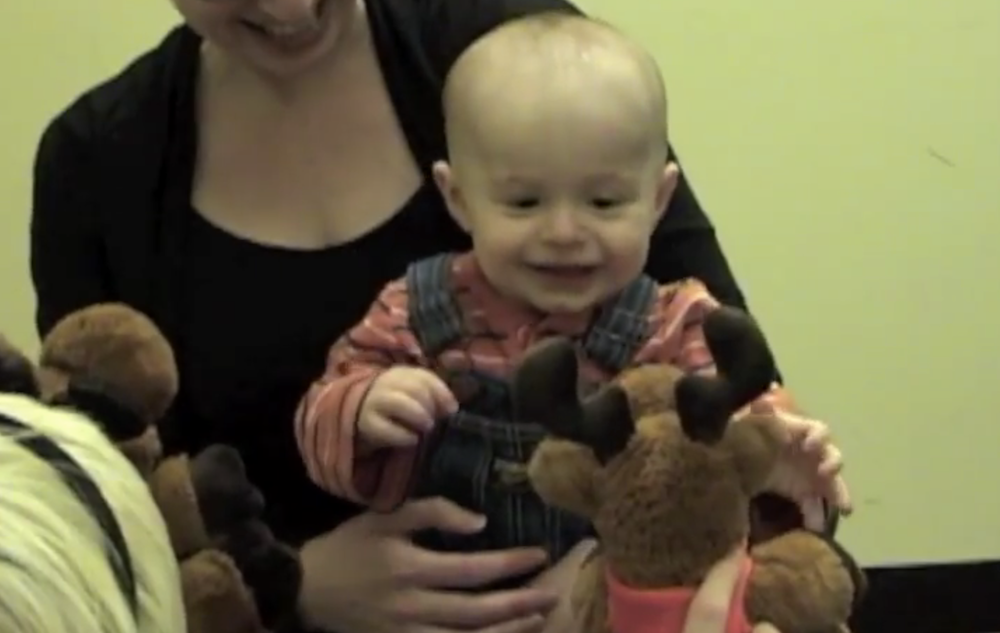Even Babies Think Crime Deserves Punishment

Get the world’s most fascinating discoveries delivered straight to your inbox.
You are now subscribed
Your newsletter sign-up was successful
Want to add more newsletters?

Delivered Daily
Daily Newsletter
Sign up for the latest discoveries, groundbreaking research and fascinating breakthroughs that impact you and the wider world direct to your inbox.

Once a week
Life's Little Mysteries
Feed your curiosity with an exclusive mystery every week, solved with science and delivered direct to your inbox before it's seen anywhere else.

Once a week
How It Works
Sign up to our free science & technology newsletter for your weekly fix of fascinating articles, quick quizzes, amazing images, and more

Delivered daily
Space.com Newsletter
Breaking space news, the latest updates on rocket launches, skywatching events and more!

Once a month
Watch This Space
Sign up to our monthly entertainment newsletter to keep up with all our coverage of the latest sci-fi and space movies, tv shows, games and books.

Once a week
Night Sky This Week
Discover this week's must-see night sky events, moon phases, and stunning astrophotos. Sign up for our skywatching newsletter and explore the universe with us!
Join the club
Get full access to premium articles, exclusive features and a growing list of member rewards.
Babies as young as 8 months want to see wrongdoers punished, a new study finds.
In contrast, younger babies prefer to see individuals being nice to one another — even when that means that someone is nice to a character who deserves a slap on the wrist.
"This study helps to answer questions that have puzzled evolutionary psychologists for decades," Kiley Hamlin, a psychologist at the University of British Columbia, said in a statement. "Namely, how have we survived as intensely social creatures if our sociability makes us vulnerable to being cheated and exploited? These findings suggest that, from as early as eight months, we are watching for people who might put us in danger."
Helping and hindering
Hamlin and her colleagues had previously found that babies prefer individuals who do nice things for others. But they wondered whether the infants would always want to see niceness for niceness' sake, or whether mean individuals might be an exception to this rule.
So the researchers set up a series of experiments using puppets to act out scenarios of helping and harming while each of 32 5-month-olds and 32 8-month-olds watched separately. After each experiment, the infants indicated their preference for the puppets' behaviors by picking their favorite puppet to hold.
The puppets — a series of cheerful characters, including moose, elephants and a yellow duck — were first shown interacting in either nice or mean ways. One puppet would struggle to open a box containing a toy, while another either jumped in to help or cruelly slammed the lid shut.
Get the world’s most fascinating discoveries delivered straight to your inbox.
Next, the infants watched as the puppet that had helped or hindered played with a ball and dropped it. A third puppet then came into the scene, either to take the puppet's ball away or to hand it back. [See video of the puppet shows]
Meting out punishment
The researchers wanted to know if the babies would prefer the ball-giving puppet or the one that took the ball away. They found that 5-month-olds always preferred the ball-giver, no matter whether the puppet that had dropped the ball had been mean or helpful in the previous scene. At this young age, the babies simply liked puppets to be nice in the moment.
But 8-month-olds were more discerning. They liked it when the third puppet gave the ball back to a previously helpful puppet. But they didn't like it when the third puppet helped out a previously unhelpful puppet. In scenarios involving the mean, toy box-slamming puppet, 8-month-olds favored a third puppet taking its ball away by 13 to three.
The researchers then repeated the experiments with 32 toddlers ages 19 months to 23 months, this time adding a twist. The toddlers got to watch puppets being nice or mean to each other and then got to play the role of rewarder or punisher. Some toddlers were shown one nice puppet and one mean puppet and asked which they'd like to share a treat with. Others were shown a nice puppet and a mean puppet, both with treats, and were asked to take a treat away from one.
In all cases, the toddlers meted out justice according to the puppets' earlier actions. Thirteen of 16 gave a treat to a nice puppet, while 14 of 16 took treats away from a mean puppet.
Social calculations
The findings, reported today (Nov. 28) in the journal Proceedings of the National Academy of Sciences, reveal that babies develop a sense of justice between 5 and 8 months of age, Hamlin said.
"We find that, by eight months, babies have developed nuanced views of reciprocity and can conduct these complex social evaluations much earlier than previously thought," she said.
Although this sense of justice may be learned, Hamlin said, the early age at which it develops suggests that an urge to punish antisocial types may be partially innate.
You can follow LiveScience senior writer Stephanie Pappas on Twitter @sipappas. Follow LiveScience for the latest in science news and discoveries on Twitter @livescience and on Facebook.

Stephanie Pappas is a contributing writer for Live Science, covering topics ranging from geoscience to archaeology to the human brain and behavior. She was previously a senior writer for Live Science but is now a freelancer based in Denver, Colorado, and regularly contributes to Scientific American and The Monitor, the monthly magazine of the American Psychological Association. Stephanie received a bachelor's degree in psychology from the University of South Carolina and a graduate certificate in science communication from the University of California, Santa Cruz.
 Live Science Plus
Live Science Plus





